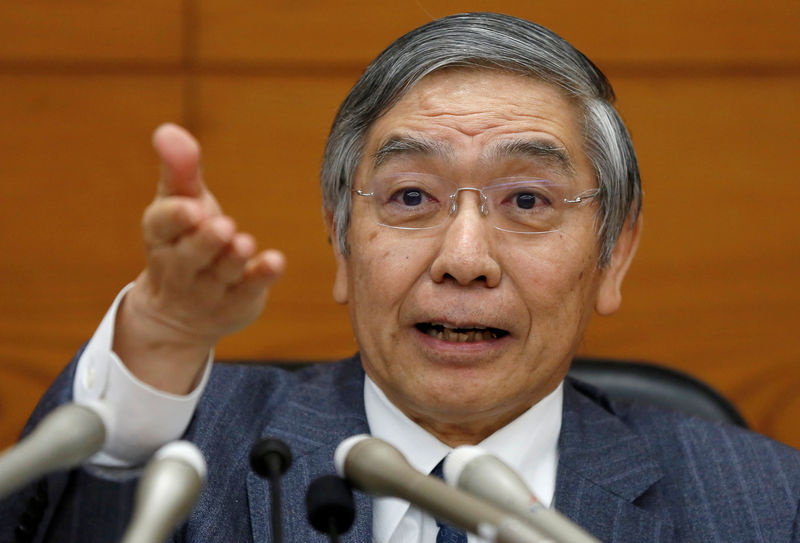By Leika Kihara and Tetsushi Kajimoto
TOKYO (Reuters) - The Bank of Japan kept policy settings steady on Tuesday but a board newcomer called for clearer commitment to ramp up stimulus if necessary, potentially complicating future efforts by the central bank to dial back its massive monetary support.
With inflation still distant from his 2 percent target, BOJ Governor Haruhiko Kuroda stressed that he saw no immediate need to exit its ultra-easy policy even as other major central banks have started to unwind their crisis-era monetary programs.
Acknowledging the rising costs and diminishing returns of his stimulus program, however, Kuroda signaled the chance of slowing the BOJ's exchange-traded fund (ETF) buying before embarking on a full-fledged withdrawal of stimulus.
"When adjustments to our framework become necessary, they don't need to involve everything in the BOJ's framework. Our (ETF) purchases focus on affecting risk premium, so we will take that into account in making a decision," Kuroda told a briefing.
The remarks came after the BOJ's widely expected decision to maintain a pledge to guide short-term interest rates at minus 0.1 percent and 10-year bond yields around zero percent.
Newcomer Goushi Kataoka voted against keeping policy steady for the second straight meeting, arguing that the BOJ should make clear its readiness to expand stimulus again if domestic factors delay achievement of its price target.
While not an official proposal for easing, the former private economist also said the BOJ should buy government bonds so 15-year yields "remain at less than 0.2 percent". The 15-year government bond yield stood around 0.307 percent on Tuesday.
The dissent by Kataoka could complicate the BOJ's efforts to follow in the footsteps of its U.S. and European counterparts in withdrawing stimulus, analysts say.
"Other central banks are unwinding easy policy, so distortions will emerge if the BOJ continues with its current framework," said Hiroaki Muto, an economist at Tokai Tokyo Research Center.
"If Kataoka proposes more easing, it just complicates things further. There are no hawks on the board, so the BOJ could lose its chance to normalize policy."
BOJ TRIMS INFLATION OUTLOOK, MAINTAINS TIMEFRAME
In a quarterly review of its projections, the BOJ slightly cut its inflation forecasts for the current fiscal year ending in March 2018 but roughly maintained its optimistic projections for the following years.
It also maintained its view that inflation will hit the 2 percent target by March 2020.
After three years of heavy asset purchases failed to drive up inflation, the BOJ last year revamped its policy framework to one targeting interest rates from the pace of money printing.
Aside from its bond purchases, the BOJ keeps buying ETFs at an annual pace of 6 trillion yen ($53 billion). The move has drawn criticism from some analysts who say it distorts markets and is unnecessary with Tokyo stock prices scaling multi-year highs.
Kuroda said that while the recovery was gaining momentum, he saw no immediate need to raise the BOJ's yield targets, slow risky asset purchases or debate a strategy for withdrawing stimulus.
"The economy is sustaining its momentum to achieve 2 percent inflation, but the momentum remains weak," he said.
Japan's economy expanded at an annualized 2.5 percent in the second quarter as consumer and corporate spending picked up, with steady growth likely to be sustained in coming quarters.
But core consumer prices rose just 0.7 percent in September from a year earlier, well below the BOJ's target, keeping the bank under pressure to maintain its ultra-easy policy.

(This story was refiled to add first name of board newcomer, Goushi Kataoka, in sixth paragraph.)